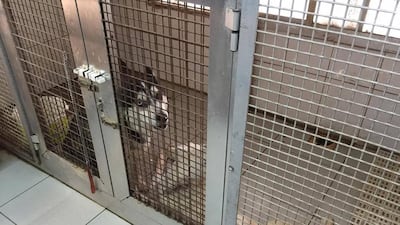The UAE Government has recently announced tougher animal welfare laws, including higher punishments for animal abuse and the illegal breeding and sale of animals. Many argue that this was an overdue legal change that follows a perceived proliferation in animal abuse cases that are reported in the media. Strict animal protection laws are an important component of improving animal welfare nationally – but are they enough?
Animal welfare legislation suffers from one major drawback: it is reactive in the sense that punishment is only given if a crime has already been committed and sufficient evidence is provided to the police.
Animals have few public advocates and within the legal system, a situation that is exacerbated by the fact that the ownership for many animals that are abused or killed is not clear.
With no formal requirement to register a pet under its microchip number nationally, for instance, any dumped, abused or killed pet found is effectively an animal without an owner, and as such prosecuting anyone about the animal’s fate becomes close to impossible, no matter how harsh the punishment.
The same is true for the vast number of unowned stray animals – cats, dogs, and others that enjoy effectively no legal protection.
Indeed, feeding stray animals can attract fines in some emirates – a problematic message sent out to the public, while at the same time stray animals continue to be subject to poisoning or pickup by pest control companies, whose operations are entirely legal.
Those who abuse animals, as a form of pleasure, entertainment or simple boredom, know and benefit from this dilemma many societies face.
There are ways to counter animal abuse, although this is clearly a process rather than a quick checklist. Legislation can help protect animals more effectively if laws touch on areas that relate to the interaction of humans and animals beyond the punishment of crimes already committed.
This includes the legal clarification of animal ownership and responsibility, for any animal traded, brought into and living in the UAE.
Obligatory microchipping and registration would be a simple way to understand the background of an animal that was dumped or killed.
“Soft” legislation can help form a society in which compassion and respect for all living things – including wildlife, stray animals and those animals that are later slaughtered in food production.
This is all the more a priority in a transient country like the UAE, in which a large number of different nationalities and cultures live. Schools, media and mosques are key institutions that can help expand people’s fundamental understanding of the value of life in all its facets, across all religions.
Effective implementation of laws also requires that society identifies and reports issues of concern over animal abuse, and be assured of subsequent action.
Animal markets are one of those places where the individual visiting has very little information and ability to tell a genuine trader apart from an illegal backdoor breeder. Nor does the public know what happens behind closed doors.
The number of complaints about such markets in the past suggest that the safeguarding of animal welfare here does not work. This raises another question, of whether in view of these problems, and with an overpopulation of local stray animals, animal markets and breeders are still appropriate ways of matching pets with owners in today’s world.
We also need to ensure legislative bodies are actually trained and have options available to deal with a range of different offenders, where is evidence is available.
Children and teenagers can commit acts of animal abuse just like adults. Releasing these children back with no consequences not only discredits the law, but it is also potentially dangerous for society to let individuals who clearly need psychological help get away with it. The idea that this is “only a child” clearly sends out the wrong message to society.
Finally, we urgently need a culture in which people do not look away. Prevention through early education and early intervention are the most effective forms of protecting animals.
For this, however, we need a clear legal message of what kind of life matters to us. If owned pets are to be protected, then what about stray animals or other animals that have no owners? Our current law still stands in its own way in this regard, as do many of us who prefer to look away rather than intervene. How we deal with animals will undoubtedly be a test for our society, testing us and future generations over one critical question: do some lives matter less than others?
Laura El-Katiri is a consultant in Abu Dhabi specialising in economic, energy and environmental policy
On Twitter: @lauraelkatiri

